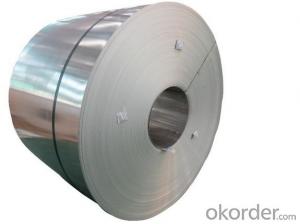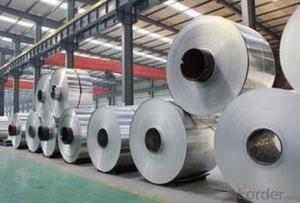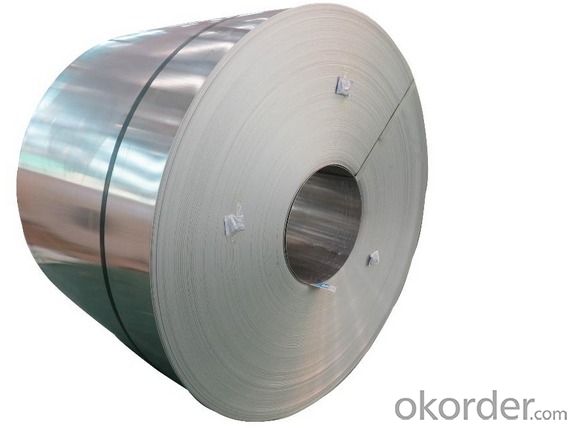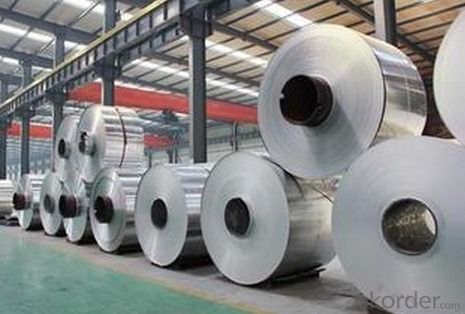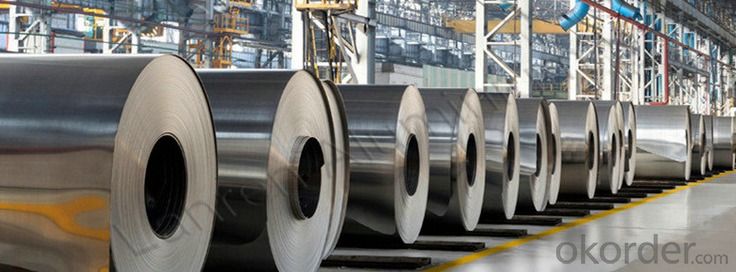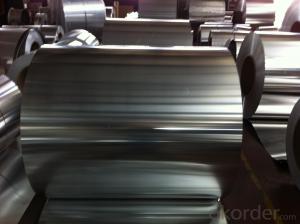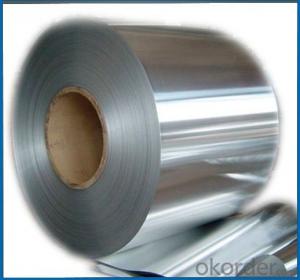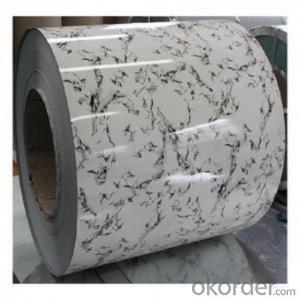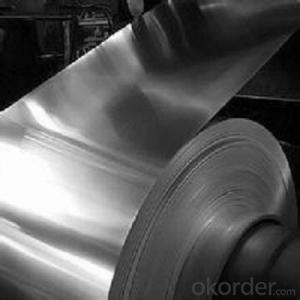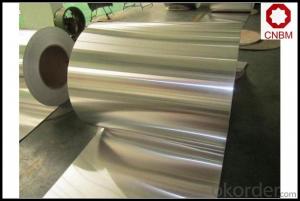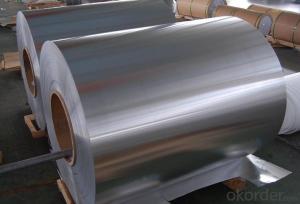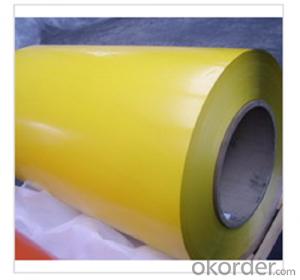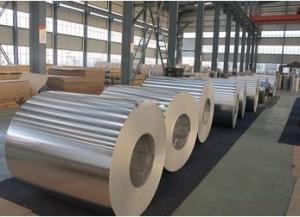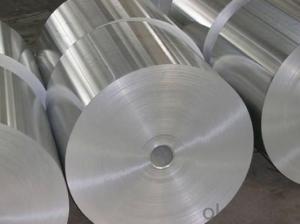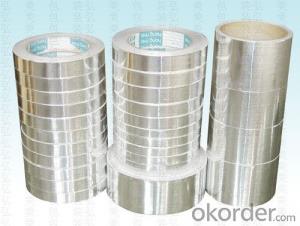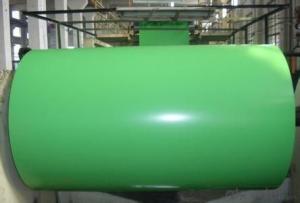Aluminum Coil for Sale for Aluminum Composite Panel Base
- Loading Port:
- Shanghai
- Payment Terms:
- TT OR LC
- Min Order Qty:
- 1 m.t.
- Supply Capability:
- 2000 m.t./month
OKorder Service Pledge
OKorder Financial Service
You Might Also Like
Specification
Specification:
Alloy No. | Thickness | Width | Temper | |
A1050,A1060, A1070,A1100,A1235,A1245 | 0.2-3.0 | 20-2300 | O,H12,H22,H14,H24,H16,H26,H18 | |
4.0-12.0 | 1000-2300 | H111,H112 | ||
A3003,A3004,A3105 | 0.2-4.0 | 20-2300 | O,H12,H22,H14,H24,H16,H26,H18 | |
4.0-12.0 | 1000-2300 | H111,H112 | ||
A5052,A5083,A5754,A5005 | 0.2-4.0 | 20-2300 | O,H12,H22,H14,H24,H16,H26,H18 | |
4.0-12.0 | 1000-2300 | H111,H112 | ||
A6061,A6082,A6063 | 0.8-3.0 | 20-2300 | O | |
A8011,A1145,A1235 | 0.005-0.2 | 20-2300 | O,,H18,H24 | |
Inner Diameter: 76mm,152mm,200mm,300mm,505mm | ||||
Packing: Export wooden pallets, wooden case | ||||
Standards: ASTM-B209. EN573-1, GB/T3880.1-2006 | ||||
Further Specification:
Quality of material: totally free from defects like white rust, oil patches, roll marks, edge damage, camber, dents, holes, break lines, scratches and free from coil set | |
MOQ | 1 ton |
Payment term | TT,L/C |
Delivery Time | 15 days after 30% TT payment or receiving L/C copy |
Kind attention: Specifications can be customized as the customer’s requirements. | |
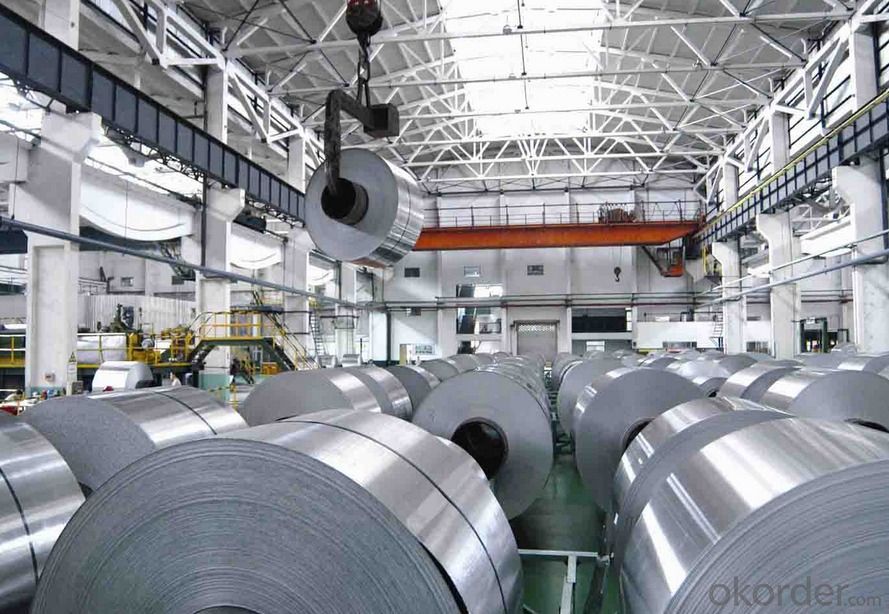
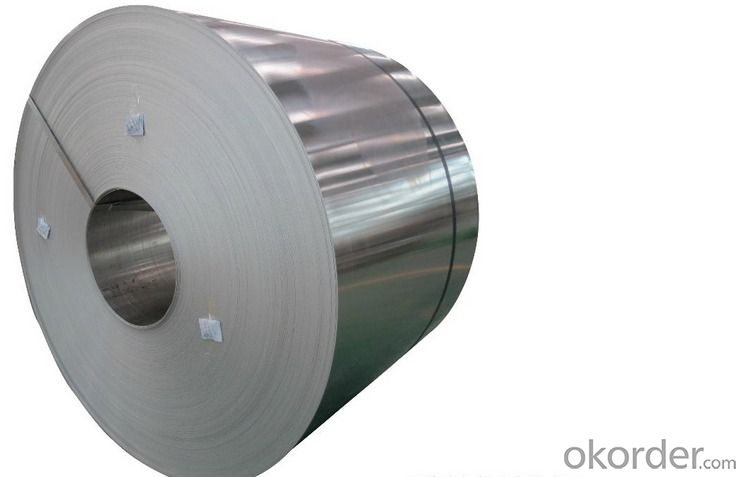
Application:
Mainly used in signs, billboards, building exterior decoration, bus body, high-rise buildings and factories
wall decoration, kitchen sink, lamp, fan leaves, with pieces of electronic, chemical equipment, sheet metal
processing parts, deep drawing or spinning hollowware, welding parts, heat exchangers, bell surface and disk,
plate, kitchenware, decorations, reflective devices, etc
FAQ of Aluminium coil for Aluminum composite panel base:
1.Superior quality of raw material.
2.Reasonable and stable chemical composition.
3.Accurate tolerance.
4.Goode mechanical property.
5.We have the certificate of ISO9001.
- Q: How are aluminum coils used in the production of transportation vehicles?
- Aluminum coils play a vital role in manufacturing transportation vehicles, especially cars and planes. These coils are typically made from high-quality aluminum alloys because they are lightweight, strong, and resistant to corrosion. In the automobile industry, aluminum coils are primarily used to build vehicle bodies, including the frame, doors, hoods, and trunk lids. The lightweight nature of aluminum helps reduce fuel consumption and improve energy efficiency. This makes it a preferred choice for vehicle manufacturers who want to meet environmental regulations and improve fuel economy. Aircraft manufacturing also relies on aluminum coils to reduce weight and ensure optimal flight performance. By incorporating aluminum coils into key components like fuselages, wings, and engine parts, aircraft manufacturers can save a significant amount of weight without compromising structural integrity and durability. The use of aluminum coils in transportation vehicles also contributes to improved safety standards. Aluminum's ability to absorb crash energy makes it an ideal material for manufacturing impact-absorbing structures, such as bumpers and crash boxes in cars. This provides enhanced protection for passengers during collisions. Furthermore, aluminum coils have excellent heat dissipation properties, reducing the risk of engine and other critical system overheating. This is particularly beneficial for high-performance vehicles, where efficient cooling is essential for maintaining optimal operating conditions. In conclusion, aluminum coils are extensively used in the production of transportation vehicles due to their lightweight, strong, corrosion-resistant, and thermally conductive properties. By incorporating aluminum coils into vehicle manufacturing, the automobile and aircraft industries can achieve weight reduction, improved fuel efficiency, enhanced safety, and superior performance. This allows them to meet evolving market demands and sustainability goals.
- Q: Is it safe or practical to use an electric iron as a heat source for an aluminum coil?
- <p>Using an electric iron to heat an aluminum coil is not advisable. Electric irons are designed to heat their own plates for ironing clothes, not to transfer heat to other materials like aluminum coils. The high temperature of an iron could damage the coil and potentially cause a fire hazard. Moreover, aluminum has a high thermal conductivity, which means it would dissipate heat quickly, making it inefficient to use an iron for this purpose. Always use heating elements specifically designed for the material you intend to heat.</p>
- Q: What are the different tensile strengths of aluminum coils?
- The tensile strengths of aluminum coils can vary depending on the specific alloy and manufacturing process. However, common tensile strengths for aluminum coils range from 20,000 to 70,000 pounds per square inch (psi).
- Q: Can aluminum coils be used in marine applications?
- Yes, aluminum coils can be used in marine applications. Aluminum is a popular choice for marine applications due to its excellent corrosion resistance, lightweight nature, and high strength-to-weight ratio. It is commonly used in the construction of boats, ships, and other marine structures. Aluminum coils are particularly useful in marine applications as they can be easily formed into various shapes and sizes, making them suitable for different parts and components in the marine industry. Additionally, aluminum coils can withstand harsh marine environments and are highly resistant to saltwater corrosion, which is a significant concern in marine applications. Overall, the use of aluminum coils in marine applications is a reliable and effective choice.
- Q: What are the necessary safety measures to take when handling aluminum oxide coated aluminum coils?
- <p>When working with aluminum oxide coating on aluminum coils, it's crucial to follow safety precautions. Always wear appropriate personal protective equipment (PPE), including gloves, safety glasses, and a dust mask to prevent inhalation of dust particles. Ensure proper ventilation to avoid dust accumulation. Handle the material carefully to prevent any skin contact with the coating. Keep the area clean and free from any flammable materials to avoid fire hazards. Be aware of the specific health risks associated with aluminum oxide exposure, and follow the manufacturer's guidelines for safe handling. Regularly inspect equipment for any signs of wear or damage that could lead to accidents.</p>
- Q: What is the maximum width and thickness of aluminum coils?
- The maximum width and thickness of aluminum coils can vary depending on the specific requirements and capabilities of the manufacturer. However, generally speaking, aluminum coils can have a maximum width ranging from 36 inches to 72 inches or even wider. As for the thickness, it typically ranges from 0.006 inches to 0.25 inches. It is important to note that these dimensions may vary in different industries and applications, so it is always best to consult with the manufacturer or supplier to determine the specific maximum width and thickness that meets your needs.
- Q: Can aluminum coils be used in heat exchanger fins?
- Yes, aluminum coils can be used in heat exchanger fins. Aluminum is a common material choice for heat exchangers due to its excellent thermal conductivity and corrosion resistance. Aluminum coils can efficiently transfer heat and withstand high temperatures, making them suitable for use in heat exchanger fins.
- Q: Can aluminum coils be painted for custom designs?
- Yes, aluminum coils can be painted for custom designs. Painting aluminum coils allows for endless possibilities in terms of customization and aesthetics. The coils can be painted with various colors, patterns, and designs to suit individual preferences and requirements. The paint application process involves cleaning the surface, applying a primer, and then applying the desired paint or coating. By painting aluminum coils, it is possible to create unique and eye-catching custom designs for a range of applications, including architectural elements, signage, automotive parts, and more. Additionally, the paint helps protect the aluminum from corrosion and enhances its durability.
- Q: How are aluminum coils used in the production of cans and containers?
- Aluminum coils are a crucial component in the production of cans and containers. These coils are typically made by continuously casting molten aluminum into thin sheets. Once these sheets are cooled and solidified, they are rolled into coils, which are then used in various manufacturing processes. The first step in using aluminum coils for cans and containers is the process of blanking. In this step, a blanking press cuts the coil into individual circular blanks, which will eventually become the bottom and the lid of the can. These blanks are carefully cut to the required size and shape, ensuring precision and uniformity. Next, the blanks are transferred to a cupping press, where they are placed between a set of dies. The press applies high pressure, causing the blank to take the shape of a cup. This cup will eventually serve as the body of the can or container. The cup is then transferred to a redraw press, where it undergoes a series of operations to improve its shape and dimensions. This process helps to achieve the desired thickness and height of the can or container. The redraw press also ensures that the cup maintains its structural integrity and can withstand the rigors of storage and transportation. After the cup has been redrawn, it undergoes a trimming process to remove any excess material and achieve the final shape. This step ensures that the can or container has a clean and smooth edge, ready for further processing. Once the cups have been trimmed, they are transferred to a base-coating station. Here, a thin layer of protective coating is applied to the inside and outside surfaces of the cups. This coating helps to prevent corrosion and ensures that the contents of the can or container remain fresh and uncontaminated. Finally, the coated cups are passed through a necking press, where the top portion of the cup is formed into a narrower neck. This neck is crucial for attaching the lid or cap to the can or container, providing a secure seal. In summary, aluminum coils play a vital role in the production of cans and containers. They are shaped into blanks, cups, and eventually transformed into the final product through various manufacturing processes. These coils ensure the durability, functionality, and integrity of cans and containers, making them suitable for a wide range of applications in industries such as food and beverages, pharmaceuticals, and cosmetics.
- Q: Aluminum coil thickness measurement, real-time measurement of aluminum coil thickness value, you can use displacement sensor?
- Yes, the two sensors measure and measure the thickness
Send your message to us
Aluminum Coil for Sale for Aluminum Composite Panel Base
- Loading Port:
- Shanghai
- Payment Terms:
- TT OR LC
- Min Order Qty:
- 1 m.t.
- Supply Capability:
- 2000 m.t./month
OKorder Service Pledge
OKorder Financial Service
Similar products
Hot products
Hot Searches
Related keywords
